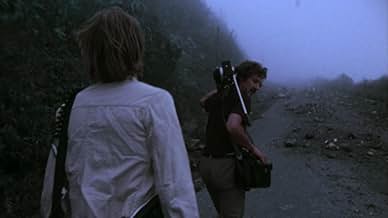La Soufrière - Warten auf eine unausweichliche Katastrophe
- 1977
- 31 मि
अपनी भाषा में प्लॉट जोड़ेंHerzog takes a film crew to the island of Guadeloupe when he hears that the volcano on the island is going to erupt. Everyone has left, except for one old man who refuses to leave. Herzog ca... सभी पढ़ेंHerzog takes a film crew to the island of Guadeloupe when he hears that the volcano on the island is going to erupt. Everyone has left, except for one old man who refuses to leave. Herzog catches the eeriness of an abandoned city, with stop lights cycling over an empty intersecti... सभी पढ़ेंHerzog takes a film crew to the island of Guadeloupe when he hears that the volcano on the island is going to erupt. Everyone has left, except for one old man who refuses to leave. Herzog catches the eeriness of an abandoned city, with stop lights cycling over an empty intersection.
- पुरस्कार
- कुल 2 जीत
कहानी
क्या आपको पता है
- ट्रिवियाDuring a Q&A session at the Eye film museum in July 2023, Ed Lachman stated that he never retrieved the glasses he forgot on La Soufrière.
- गूफ़Louis-Auguste Cyparis was not the only survivor of the volcanic eruption-- there were 3 in total, including a young girl and a shoemaker-- and he died in 1929, not 1956.
- कनेक्शनFeatured in Was ich bin, sind meine Filme (1978)
- साउंडट्रैकSiegfried's Funeral Music (from The Ring of the Nibelung)
Composed by Richard Wagner.
It's this collision of Herzog's own subjective fascination and fear of the volcano, and the simple 'here's what's happening' facts of the deserted village, that makes La Sofriere a work that almost comments on Herzog's own obsessions as a filmmaker, though not quite. It would work totally for someone who's never seen a Herzog film, I think, as in essence its the telling of a basic story where nature is on the verge of chaos, which is not something that is hard to find on a National Geographic special (although they, most likely, would have the volcano exploding at the end). But for fans, or just those who know the director's methods with his real-life subjects, one sees him perhaps going too far, which is part of the fun: at one point he bypasses the government-set road blocks and then is out of the car in a panic as the volcano rumbles, waving the car to get out of the shot as he has a truly petrified look on his face. And the shots of the mountainside itself are vintage Herzog, maybe a given due to the subject matter, set to somber classical music and more contemplative than anything on the nature of, well, nature.
The latter of this extends to the interviews with the people who've decided to stay on the island even if it means certain death. The subjects, maybe to a more clear and personally accepting reason, don't mind, and are not afraid of death (the poor one, who has nothing and can't even get off the island anyway, is fine with it as it is "God's will"). Herzog tends to stick with these guys for a good chunk of the film, which leads to a little distracting side-note with one of the villagers singing(?), but it's a captivating chunk all the same as we see men who are possibly as crazy as Herzog, though with many more years of experience (and other natural weather disasters like typhoons) that they've lived through anyway. Herzog mentions that the social situation, of the disenfranchised left on the island, are what he still thinks about after the threat has ended and things go back to normal and the volcano is forgotten. But I wonder if he might think about himself in what is supposed to be inevitable chaos, and how the alleviation of it only leads him to seek other ventures (ala the making of Fitzcarraldo) that spell just as much peril, if not more on his own psychological state.
It's a stark statement that is mostly underlying in the film, and aside from that aspect La Soufriere is a worthwhile story to tell about the nature of a society near a volcano (i.e. the town on the Martinique island in 1902), and what it looks like no-holds-barred.
- Quinoa1984
- 1 जून 2007
- परमालिंक
टॉप पसंद
विवरण
इस पेज में योगदान दें























